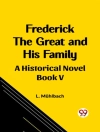Elinor Glyn’s provocative novella ‘Three Weeks’ delves into the intricate dance of love and desire against the backdrop of early 20th-century societal conventions. The narrative unfolds in a lush, romantic prose that captures the tension between passion and propriety, offering readers a glimpse into the secret lives of its characters. Glyn’s treatment of sensual themes, combined with her insightful commentary on social class and gender, positions this work within the literary cont...
เกี่ยวกับผู้แต่ง
Elinor Glyn (1864–1943) was a trailblazing British novelist and scriptwriter known for her romantic fiction that scandalized the conservative society of her time. B...
ซื้อ eBook เล่มนี้และรับฟรีอีก 1 เล่ม!
ภาษา อังกฤษ ● รูป EPUB ● หน้า 125 ● ISBN 8596547012191 ● ขนาดไฟล์ 0.4 MB ● สำนักพิมพ์ DigiCat ● เมือง Prague ● ประเทศ CZ ● การตีพิมพ์ 2022 ● ที่สามารถดาวน์โหลดได้ 24 เดือน ● เงินตรา EUR ● ID 8414613 ● ป้องกันการคัดลอก โซเชียล DRM












